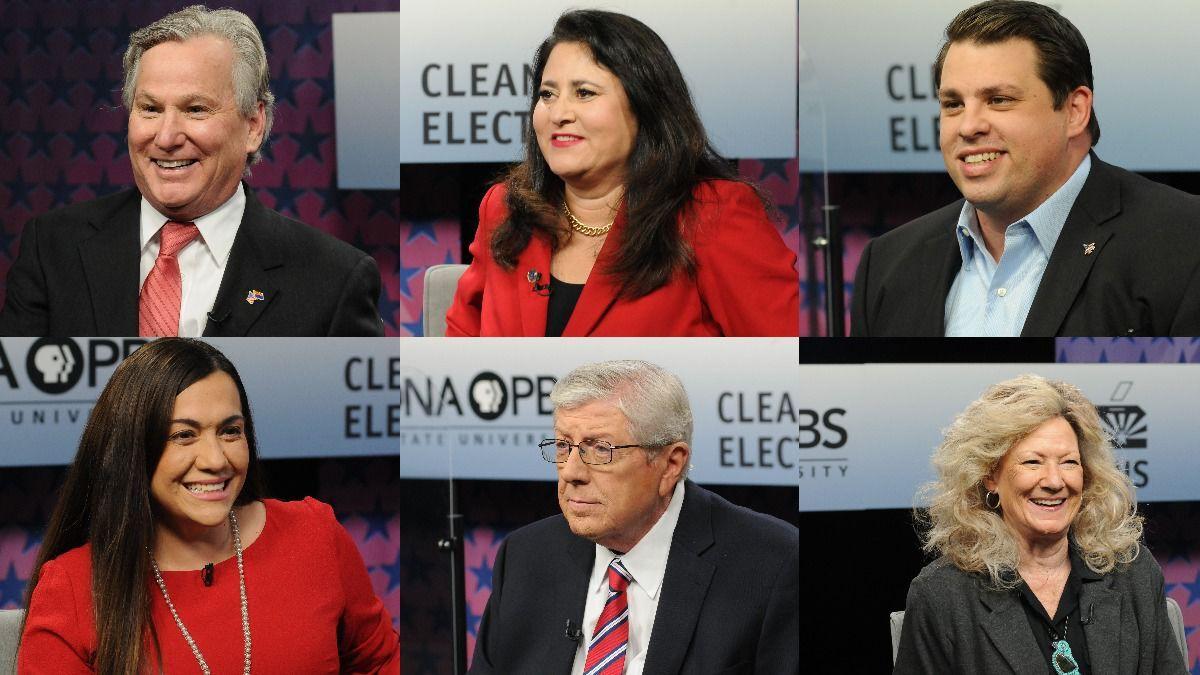A Democrat and two Republicans continued to lead a race for three seats on the five-member Arizona Corporation Commission, which regulates utilities in the state.
After postings of newly counted ballots by several counties Friday, Democrat Anna Tovar, mayor of Tolleson, maintained her lead in the polling over Commissioner Lea Marquez Peterson, a Tucson Republican.
Marquez Peterson, who sought election after being appointed to fill a vacancy on the commission last year, remained ahead of Scottsdale Republican Jim O’Connor, a retired businessman.
The top three vote-getters will be elected to four-year terms on the commission, which besides electric, gas and water utilities regulates corporations and pipeline and railroad safety in the state.
Republican Eric Sloan followed in fourth place after edging ahead of Democrat Bill Mundell, an attorney and former commission member, while Democrat Shea Stanfield remained at bottom of the pack.
Thousands of ballots remained uncounted statewide Friday evening, but if the results hold, Democrats would gain a second four-year seat but fail to break a majority on the regulatory panel that Republicans have held since the mid-1990s.
It’s unclear if a new Republican majority would support proposed new clean-energy rules, including a goal of zero carbon emissions by 2050, tentatively approved by the commission’s current Democratic member and two departing Republicans.
The three newly elected commissioners will serve four-year terms and join Republican Justin Olson and Democrat Sandra Kennedy on the ACC.
The new Corporation Commission will dictate the pace and scope of Arizona’s move away from fossil fuels to carbon-free energy, as the first to implement a new set of rules intended to move Arizona away from fossil-fuel power generation to a cleaner energy future.
Last week, the current commission gave tentative approval to new rules requiring state-regulated utilities including Tucson Electric Power Co. and Arizona Public Service Co. to get 100% of their power from carbon-free sources including nuclear power by 2050 — with interim carbon-emissions reductions of 50% by 2032 and 75% by 2040 — and to generate at least 50% of their power from renewable sources by 2035.
The new clean-energy standards, which allow utilities to request waivers especially if needed to maintain electric reliability, passed on a 3-2 vote, with Kennedy joined by Republicans Bob Burns, the panel’s current chairman, and Commissioner Boyd Dunn.
Olson and Marquez Peterson, who was appointed last year to fill a vacancy caused when former commission member Andy Tobin was named director of the Arizona Department of Administration, voted against the new standards.
Olson, who was not up for re-election this year, has said he opposes any mandates that could raise ratepayer costs and that the adoption of solar has driven rate increases.
Other parts of the new energy rules given initial approval would require utilities to increase energy storage, including customer-owned battery systems, and significantly boost the state’s energy-efficiency goals.
But the proposals adopted so far were amendments to a package of proposed energy rules that have not yet been finalized, and a new commission could decide to ditch them.
The current Corporation Commission is scheduled to discuss and possibly vote on the rules at a special open meeting on Nov. 13.
Burns is leaving office in January after reaching his two-term limit for commissioners. Dunn had begun a run for re-election but failed to qualify for the primary after some of his nominating signatures were rejected.
Marquez Peterson said during a vote on the new energy rules that she supported the carbon-emission reductions but doesn’t support mandates for renewable energy.
O’Connor — who made the general-election ballot after waging a primary write-in campaign — has said he generally opposes any mandates or subsidies. His campaign website says he is fighting “job-killing green energy mandates.”
Sloan has said he doesn’t support mandating renewable energy, while Mundell and Stanfield ran with Tovar on a pro-solar platform.
The new energy standards — which count power from APS’s Palo Verde nuclear plant as a carbon-free “clean energy” source — will replace the state’s current renewable-energy standard, which requires utilities to get 15% of their power from renewables like solar and wind by 2025.
The proposed new standards would bring Arizona more in line with other states that have boosted their clean-energy goals or mandates in recent years.
Besides the clean-energy issue, the new commission will also face final proceedings on pending rate cases filed by TEP, APS and Southwest Gas and continue to grapple with the impact of the COVID-19 pandemic on ratepayers, among other pending issues.





